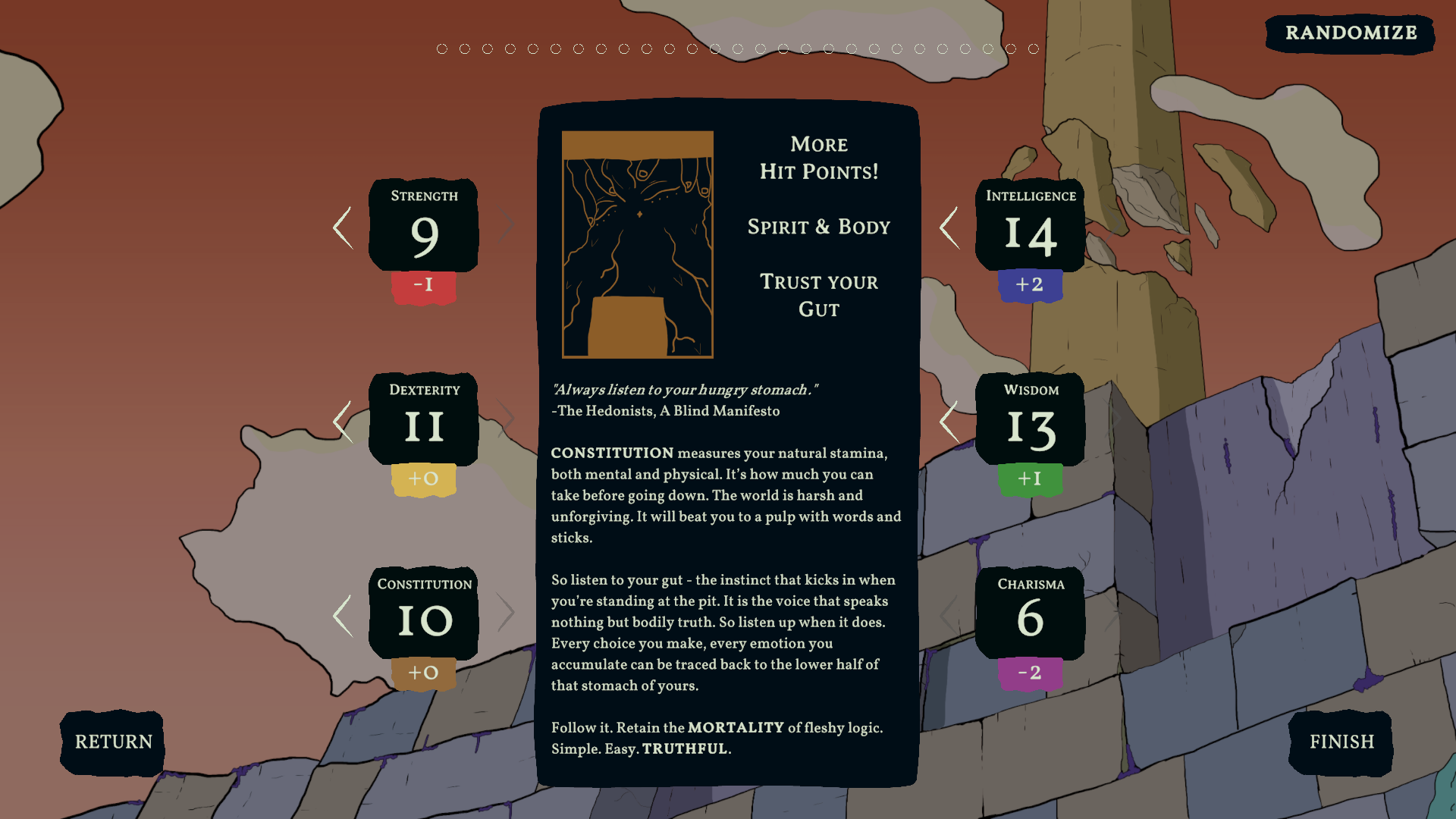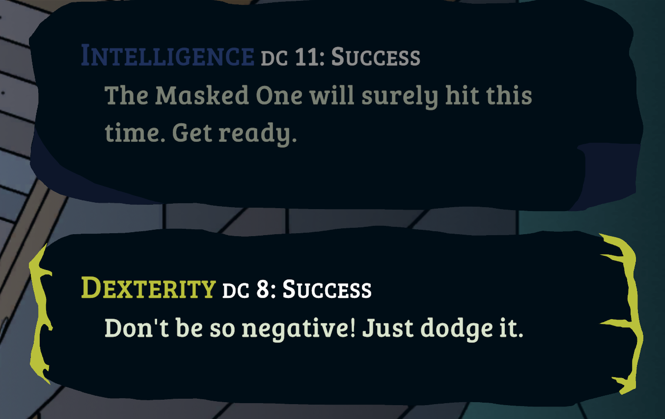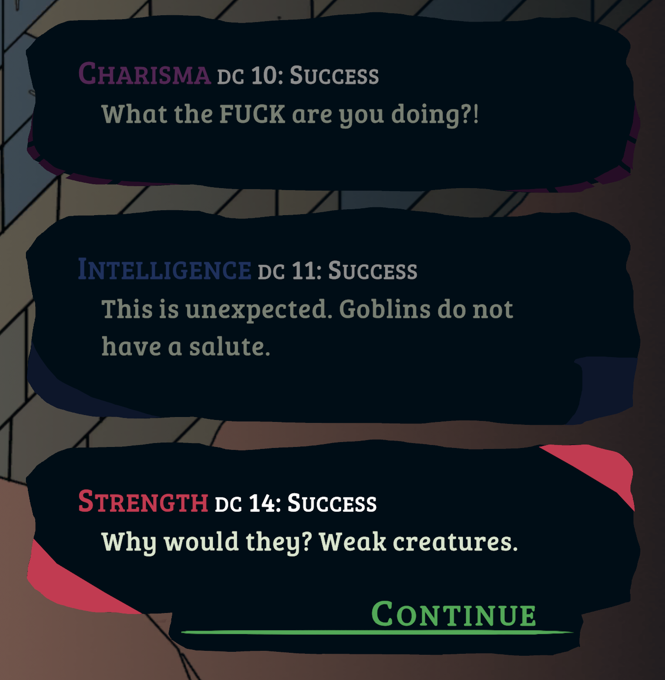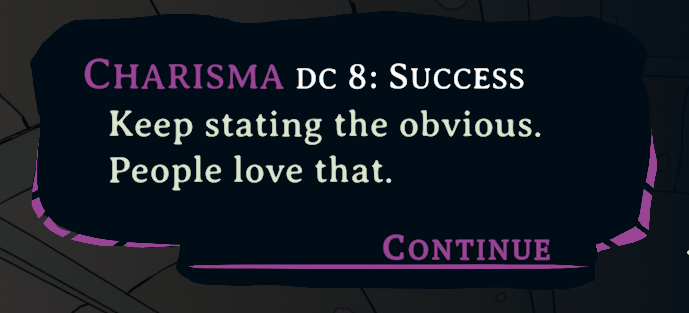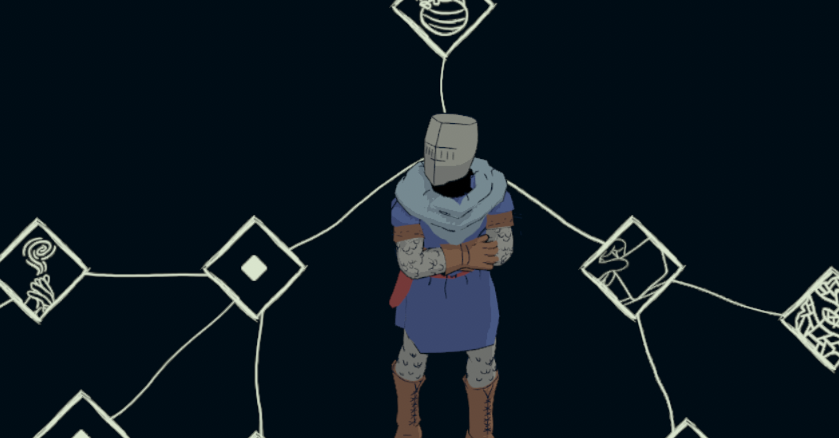An Esoteric Campaign - Ability Scores
Why a cleric?
I could've chosen anything. There's lots of classes in 5e to pick from. When I decided to focus on just one in particular however, the cleric was the only clear choice for me. Apart from my personal bias, cleric is the one class that stretches over, I would argue, most fantasy tropes. It has the widest class fantasy. You've got the armored melee warrior. Holy-man priest. The utility of spellcasting. All in one solid package that can be molded into various archetypes. At just a glance the Cleric in Esoteric Ebb is all of those things and more. He's an 'Arcane Cleric', so he has a spellbook. He's a healer and a member of a holy order, with much of his demeanor being more Paladin-like than anything else. But there's a problem with that. It might account for a player who wants to build
INT,
STR, or
WIS. But what about the rest?
Early in development I remember looking at the character creation and progression of
Planescape: Torment. If you've ever been recommended this game by someone, you might have heard a variation of the classic tip: 'Go
INT,
WIS, or
CHA. Dump the rest.' It's a good tip if you want access to the most interesting choices in the game. That's not to say a
STR/DEX/CON run won't be interesting, but it feels a lot more restrictive in dialogs. And since most of the game is spent in dialogs... well, I know a number of people who simply restarted the game when they realized they 'picked wrong'.
Screenshot from the First Draft Playtest.
Esoteric Ebb has almost the exact same character creator as
Planescape: Torment. Six ability scores, X amount of points. Go. Make a character that you barely know anything about. Make a
decision. I've found players usually build an immediate picture of what they want to play as in their heads. That picture will be heavily based on everything they've heard about the game before they fire it up. So let's look at it this way:
What ability scores would a cleric usually go with?
I DM four different campaigns right now, so it's been a while since I last got a chance to be a player. But my last character was a Tempest Cleric with a slightly above average statline. 14, 12, 16, 11, 18, 9. A cleric should run with Wisdom, since it's the casting mod. Low level I usually hit stuff with a shovel and acted like a 'tank', so
CON and
STR were my other focuses. And
DEX is just good to have.
But what if I want to build a cleric with low Wisdom? You could make the argument that such a character should be unable to tap into divine magic with any overt success. You could also make the argument that a character could use any ability score as a casting modifier if you're creative enough (and ignore some balancing issues). I think most of that is solvable, especially in a single-player that's sold as a 'homebrew experience'. But more interesting I would say is the question of
PERSONALITY.
In the playtest the ability scores often act as advertisements for their type of gameplay. Dexterity tells you to dodge, Intelligence tells you to cast a spell. Basic stuff.
Why are only half of the ability scores relevant for social roleplaying? It's a rhetorical question in some part, because the answer is obvious. Mental stats are in the brain. Body stats are in the not-brain. Duh. But something I wanted to explore with Esoteric Ebb (and something that’s obviously already been done by thousands of other TTRPGs) was to make the entire statline explicitly impact the personality of the character. There is a major problem with this however. It's much easier to extrapolate a personality from having low or high
INT. But
STR? And
CON? Stupid/Smart is easy to define. Or easier at least. How would
STR be defined and performed by a player?
In
Esoteric Ebb I tried a simple solution to this. Each stat is specifically tailored for the Cleric. If you imagine each character in this world I've created has a statline of six ability scores, then every person would have a different version of
STRENGTH floating around in their head. Just like I would argue, two characters with 20
INTELLIGENCE could be defined and performed as 'smart' in very different ways.
The CLERIC's ability scores are (currently) defined as this:
- Strength is the search for meaning, religion, and masculinity.
- Dexterity is avoiding consequences, self-interest, and freedom.
- Constitution is your gut feeling, bodily truth, and stubbornness.
- Intelligence is the search for power, ego, and memorization.
- Wisdom is your esoteric understanding, empathy, and femininity.
- Charisma is social manipulation, force of personality, and the desperate need for love.
Beyond these general themes, I'm also trying to build each ability score into a real character. Each of which is of course a partial truth of the Cleric's own sense of self. It's an interesting way of writing interactive dialogs. Often the design can lean into the idea of having several different versions to play as. Are you the protagonist that kicks baby seals or the one that recycles every tuesday night? Or in
Planescape: Torment's case, which type of reincarnation are you this time?
I'm not too happy with some of the DC balancing on chimes in the playtest. In this case, should the DC for Strength's harsh reply be higher or lower?
In
Esoteric Ebb I'm trying to make the Cleric a protagonist that is conflicted in six different directions at once. The ability scores you choose to be higher at the start of the game are simply the dominant voices - but each dialog option is something the Cleric
could do or say, if things were only slightly different. Each ability score should give both a unique narrative tone and a different mechanical experience. Here's a few examples I'm trying to hit:
- High DEX will let you steal important quest items.
- Low INT will let you debate confidently on topics you have no clue about.
- High CHA will let you say completely out-of-character things just to 'win' an argument.
- High WIS will let you attune to more magic items.
- Low STR will let you say the most insecure shit.
- High CON will spoil every secret in the game for you in a way you won't understand. (Like a slightly less wacky Malkavian.)
Apart from setting them apart story-wise, I'm planning on making sure every stat has a clear gameplay benefit. Obviously
CON will get you more hit points, but what sort numbers-benefit should Charisma give? I have a few ideas I'm toying with, but a lot of it has to do with balance, so it's hard to talk about it this early. Either way I'm excited to see where it all ends up.
In the playtest Charisma often acts as a sort of social common sense.
I'm extremely grateful for all the feedback given during the playtest so far. It's especially useful that so many of you have given your thoughts on the ability scores and the writing in general. I'm currently working hard to make sure the full game will be as coherent and not-bad as I can. The inner workings of the Cleric I would say are pretty important for that.
The First Draft Playtest will be kept up, so feel free to share it around! I'm reading every survey response and all of it's invaluable. I’m eternally grateful, thank you.


























